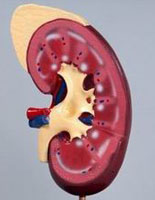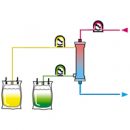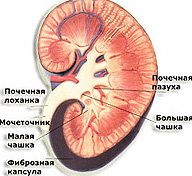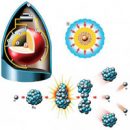Chronic renal failure long-term progressive disease, which is based on the gradual death of the working unit of the kidney of nephron. Despite the high compensatory ability of the kidney, already in the early stages there are disorders of the electrolyte balance.
Content
Chronic renal failure is a gradual decrease in the renal function to its complete disappearance caused by the gradual death of renal tissue as a result of a chronic kidney disease. Chronic renal failure occurs in 200-500 of one million people. Currently, the number of patients with chronic renal failure increases annually by 10-12%.
Causes of chronic renal failure
The causes of the occurrence of chronic renal failure can be various diseases that lead to the defeat of the kidney glomers:
- Kidney disease - chronic glomerulonephritis, chronic pyelonephritis
- Diseases of metabolism - diabetes, gout, amyloidosis
- Congenital kidney diseases - polycystic, underdevelopment of kidneys, congenital narrowings of renal arteries
- Rheumatic diseases - systemic red lupus, sclerodermia, hemorrhagic vasculitis
- Vascular diseases - arterial hypertension, diseases resulting in disruption of renal blood flow
- Diseases leading to a violation of urine outflow from the kidneys -Omethamial disease, hydronephrosis, tumors, leading to gradual compression of urinary tract
Most often, the causes of chronic renal failure are chronic glomerulonephritis, chronic pyelonephritis, diabetes and congenital kidney development abnormalities.
Mechanisms of manifestation of the disease
 The development of chronic renal failure is always underlies the gradual death of the main worker unit of the kidney - nephron. The remaining kidney nephrons are forced to work with an increased load. Nephron, working with increased load in turn are as more prone to changes and death. Despite the fact that the compensatory kidney capabilities are high (even the remaining 10% of nephrons are able to maintain water-electrolyte balance in the body), already in the early stages of chronic renal failure, there are violations of the electrolyte composition of blood, acidosis (acidification), the exchange of protein in the body is distinguished. Exchange products: urea, creatinine, urinary acid. To date, more than 200 substances were revealed, the exchange of which in the body is violated in renal failure.
The development of chronic renal failure is always underlies the gradual death of the main worker unit of the kidney - nephron. The remaining kidney nephrons are forced to work with an increased load. Nephron, working with increased load in turn are as more prone to changes and death. Despite the fact that the compensatory kidney capabilities are high (even the remaining 10% of nephrons are able to maintain water-electrolyte balance in the body), already in the early stages of chronic renal failure, there are violations of the electrolyte composition of blood, acidosis (acidification), the exchange of protein in the body is distinguished. Exchange products: urea, creatinine, urinary acid. To date, more than 200 substances were revealed, the exchange of which in the body is violated in renal failure.
Four stages of chronic renal failure. The first stage - latent. In this stage, the patient may not make complaints or arise fatigue during exercise, weakness appearing in the evening, dry mouth. With a biochemical study of blood, small disturbances of the electrolyte composition of blood are detected, sometimes protein in the urine.
Second stage - compensated. In this stage, the complaints of the patients are the same, but they arise more often. Accompanied by an increase in urine release to 2.5 liters per day. Changes are found in the biochemical indicators of blood and in urine tests.
Third stage - intermittent. The work of the kidneys is even more decreasing. There is a persistent increase in the blood of nitrogen exchange products (protein exchange) - an increase in urea, creatinine. The patient has a common weakness, fast fatigue, thirst, dry mouth, appetite sharply decreases. The skin acquires a yellowish tint, becomes dry. The patient can significantly leak the usual respiratory diseases, angina, pharyngitis. In this stage, periods of improvement and deterioration in the patient can be expressed.
Fourth Stage - Terminal (Ultimate). Kidney filtration capacity drops to a minimum. The patient may feel satisfactorily for several years, but in this stage in the blood, the amount of urea, creatinine, uric acid is constantly increased, the electrolyte composition of the blood is impaired. All this causes uremic intoxication or uremia (Uremia - Watering in the blood). The amount of urine released per day decreases to its complete absence. Amone other organs are affected. Dystrophy of the heart muscle occurs, pericarditis, insufficiency of blood circulation, pulmonary swelling. Violations by the nervous system are manifested by symptoms of encephalopathy (breaking sleep, memory, mood, the occurrence of depressive states). Violated the production of hormones, changes in the rolling system of blood arise, immunity is disturbed. All these changes are irreversible. Nitrogenous exchange products are allocated from then, and the patient constantly smells urine.
The diagnosis of chronic renal failure is raised if the duration of the disease is more than 5 years old, characteristic changes are present in the blood and urine. Be sure to try to find out the reason that led to chronic renal failure.









